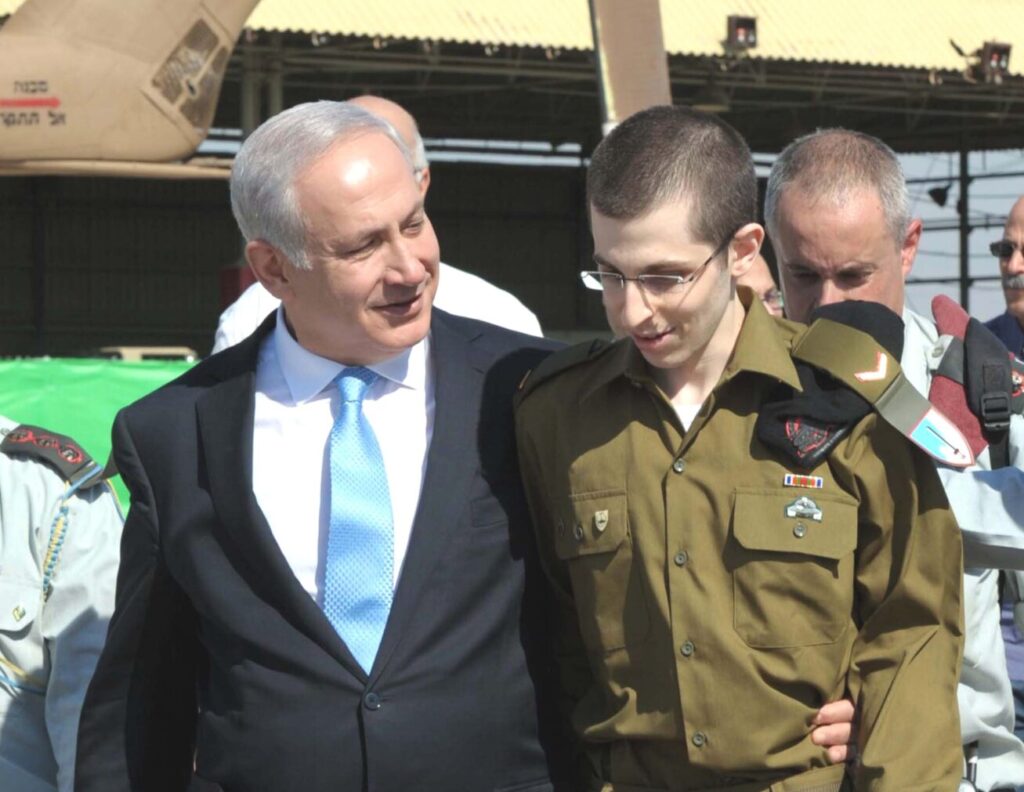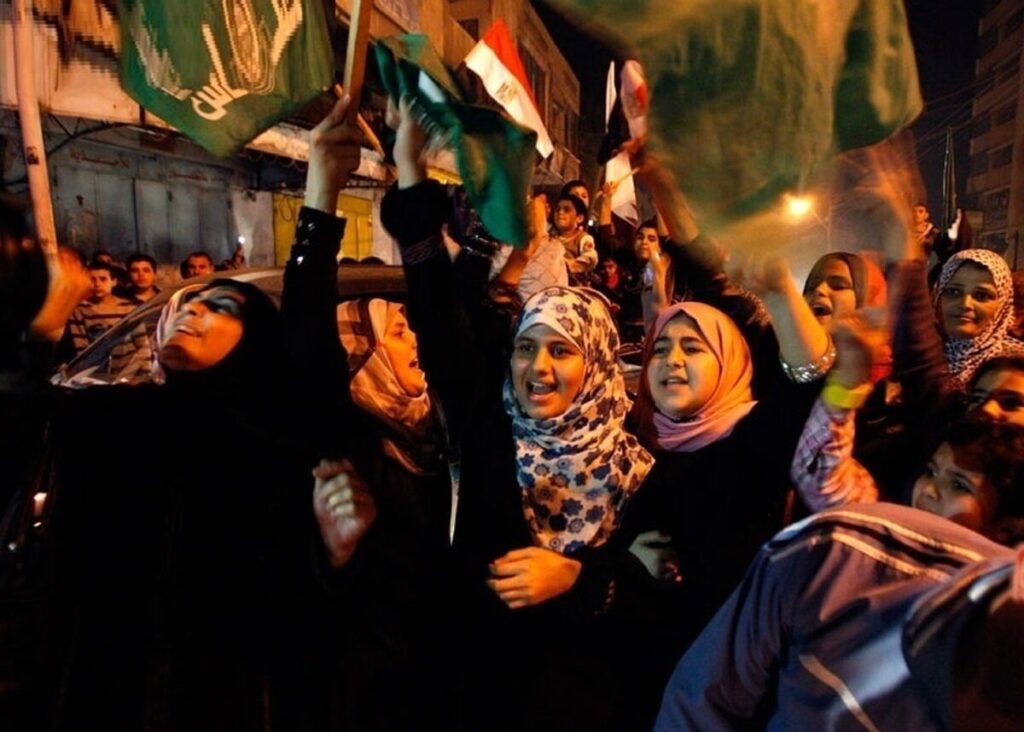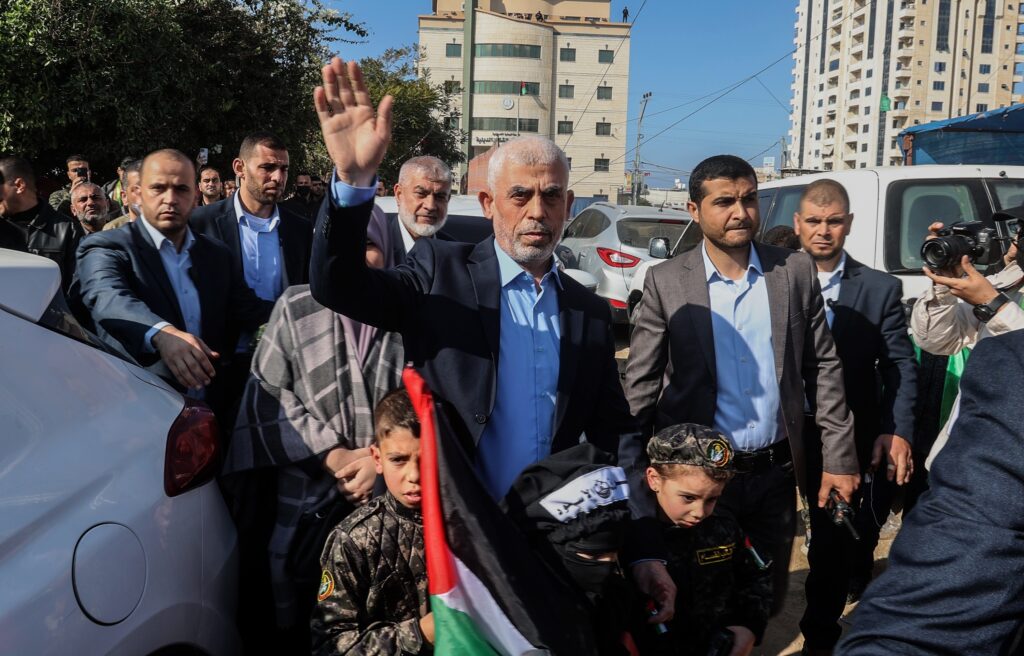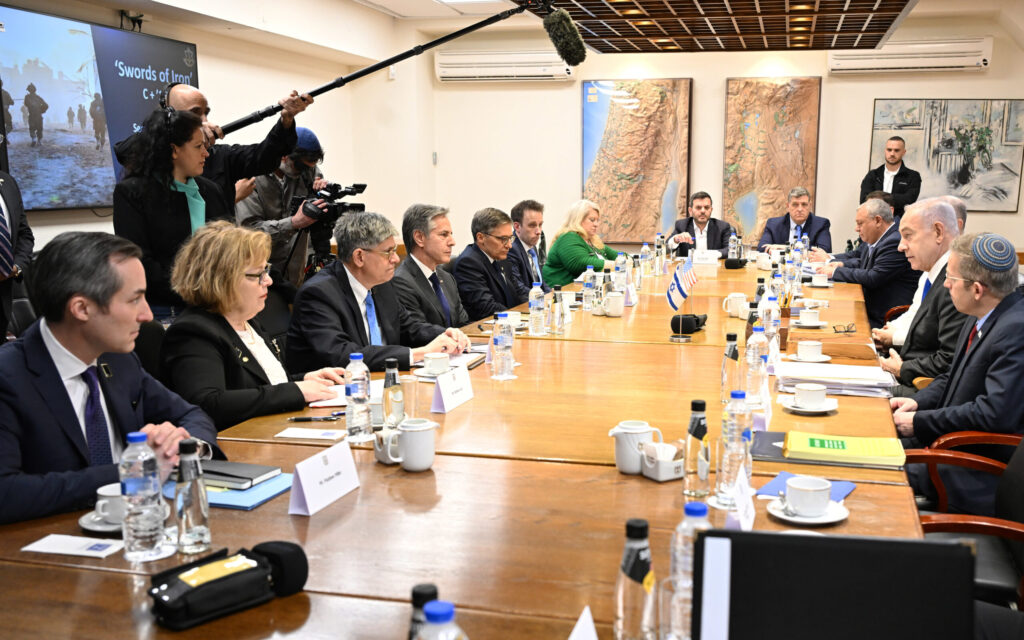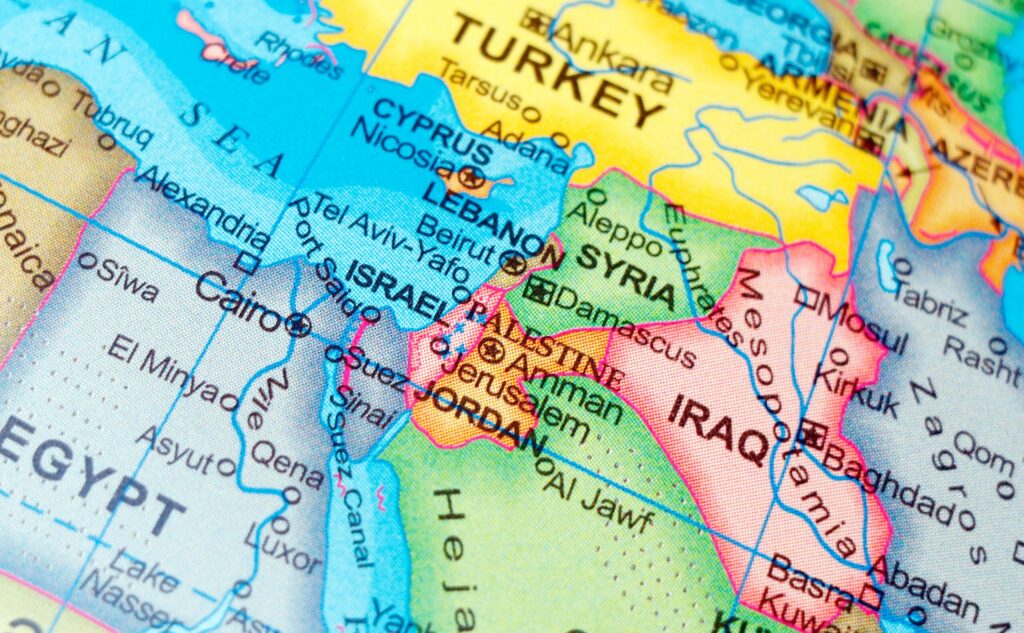UPDATES
The Aftermath of Toulouse
Mar 23, 2012
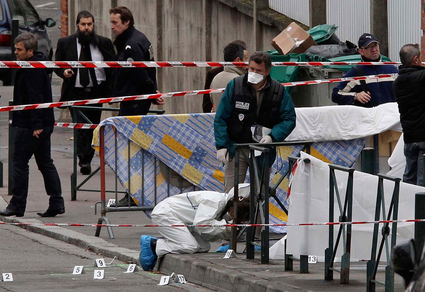
Update from AIJAC
March 23, 2012
Number 03/12 #06
With the self-confessed murderer, a 23-year-old Frenchman of Algerian origin named Mohamed Merah, now having been killed by French police, this Update looks at the aftermath of the horrific shootings of three children and a teacher at a Jewish school in Toulouse, France, earlier this week. (Some chilling details of the murderers actions at the Ozer HaTorah school, as revealed on security camera footage, are here.)
It leads with a general overview of the significance of the attacks from Israeli commentator and writer Dr. Manfred Gerstenfeld. Gerstenfeld deals with the likely response of the French Jewish community, which has been subject to similar attacks in the past and has sometimes felt less than supported by French political leaders, as well as reporting the feelings of other European Jewish communities. He also looks at the context in terms of the French presidential election campaign, and a controversy which erupted over remarks by EU Foreign Minister Catherine Ashton which appeared to link or compare the attack to the situation in Gaza. For Gerstenfeld’s valuable background, CLICK HERE. More on the situation and reaction of the French Jewish community, and the wider debates in France, comes in a video interview with French Jewish journalist Michel Gurfinkiel.
Next up is security analyst Max Boot, looking at this incident in terms of the wider fight against Islamist terrorism of the sort represented by Merah. Boot notes that Merah is apparently a French homegrown extremist, but one who was trained and possibly given orders or direction in Afghanistan and Pakistan. He argues that the only solution is constant vigilence and attention – both against extremists at home, but also against terrorism safe-havens such as Afghanistan, Yemen, Pakistan and Somalia, taking on those who question the need for both. For his full argument, CLICK HERE. Boot had another good post debunking those who insist an Israeli-Palestinian peace is the answer to terrorism. Andrew Bolt notes that Merah was radicalised in prison, and documents that this is an all too consistent pattern, and one that clearly calls for more of Boot’s “vigilance”.
Finally, Washington Institute scholar David Pollack looks at the problem of incitement, particularly on the Palestinian front, as a contribution to attacks like this one. He notes that Palestinian Authority (PA)President Mahmoud Abbas forthrightly condemned the attack (and after Pollack’s piece was written, Palestinian PM Salam Fayad made an even clearer statement demanding “criminals… stop marketing their terrorist acts in the name of Palestine”), but he also documents that the PA constantly lionises killers of innocent Israel civilians, and engages in others forms of incitement that encourages similar acts. Moreover, he adds that, contrary to Palestinian claims that the problem is largely in the past, “the PA’s record about glorifying violence against civilians has generally taken a turn for the worse” in recent months. For this important look at how incitement contributes to acts like the massacre in Toulouse, CLICK HERE.
Readers may also be interested in:
- Barry Rubin had some knowledgeable and insightful discussion on how it is not only in the Middle East that there are examples of incitement about Israel and Jews which contribute to making events like the Toulouse massacre more likely (A version of his piece appeared in today’s Australian.) Others making similar points are here and here.
- The response to the massacre of Nobel Laureate Elie Wiesel. Another look at Jewish tradition and response to such tragedies is here.
- The mixed response in the Arab media to the Toulouse massacre.
- Editorials on the hatred behind such a massacre from the Jerusalem Post and New York Sun.
- Veteran Australian Jewish leader Isi Leibler, now based in Israel, discusses the complexities of intergrating Israel’s Arab minority.
- Some examples from the many stories and comments now appearing at AIJAC’s daily “Fresh AIR” blog:
- Daniel Meyerowitz-Katz on Toulouse and security for Jewish schools and on the strange Sydney Morning Herald editorial on the Toulouse tragedy.
- Numerous media appearances in Australia by AIJAC guest and noted Iran expert Dr. Emanuele Ottolenghi.
- AIJAC’s Colin Rubenstein on the realities of the ugly and unstable situation in Gaza.
All eyes on Toulouse
Analysis: Toulouse murders hit global nerve, impact of killings goes far beyond France
Manfred Gerstenfeld
Ynet.com, 03.22.12,
Murders in France and the rest of the world are frequent and a significant percentage of murder victims are children. Yet the murder of a teacher and three children at a Toulouse Jewish school drew worldwide attention. Trying to interpret the many aspects of this issue at an early stage will help one comprehend the events once the story develops in the coming weeks.
For French Jews, this tragedy recalls key events of past decades, even before it became known that the prime suspect is an al-Qaeda sympathizer. Among others is the murder of six people in the Jewish Goldenberg restaurant in Paris, most probably by the Arab Abu Nidal group in 1982.
There were two other murders of Jews with clear anti-Semitic motives committed by Muslims in the past few years. The murder of Ilan Halimi by the “Gang of Barbarians” led by Youssouf Fofana in 2006 is the best known.
It is not only French Jews who recall ugly statements made in the past by French politicians. In October 1980, there was a lethal bomb attack on a synagogue on the Rue Copernic in Paris. As former Israeli Ambassador to France Avi Pazner recalls: “Raymond Barre, the (right-wing) French prime minister at the time, displayed hidden anti-Semitic feelings when he stated that the terrorists had aimed at the Jews, but had killed innocent Frenchmen.”
The French Socialist Party has a particularly loathsome past. When in late 2000 a flood of anti-Semitic incidents began, the Jospin government and in particular, Minister of the Interior Daniel Vaillant closed their eyes. They feared that “the social peace” in France would be undermined if they told the truth – that most of the attackers were Muslims from immigrant families.
In January 2002, when major anti-Semitic eruptions in France had already been taking place for well over a year, Socialist Foreign Minister Hubert Védrine implied empathy for the Muslim violence against Jews in France stating: “One doesn’t necessarily have to be shocked that young Frenchmen of immigrant origins have compassion for the Palestinians and are extremely excited seeing what is happening.”
There are also current national aspects. France is in the middle of a bitter presidential campaign in which immigration issues play an important role. In attacking ritual slaughter – halal or kosher – the UMP Party of President Nicolas Sarkozy went to extremes.
After the murders, the two prime candidates for the presidency are taking no risks. Sarkozy visited the school in Toulouse together with Richard Prasquier, the leader of the French Jewish umbrella organization CRIF. Both Sarkozy and his main opponent, Socialist Francois Hollande, refrained from campaigning for two days.
The Ashton controversy
The impact of the murders, however, went far beyond France. Jewish communities all over Europe implemented increased security measures. Ervin Kohn, head of the Jewish community in Oslo told the daily Dagbladet, “This could just have easily happened in Norway. We do not feel safe.” He added that the Jewish community is a vulnerable group and would like to see permanent police protection at its institutions.
In the Netherlands too, extra security measures for Jewish institutions were put in place. The fact that the Dutch government is unwilling to contribute toward the Jewish community’s large expenses for security is a long matter of conflict between it and the community. In Belgium, England, Italy and other European countries, Jewish communities expressed their fears. Even in New York, increased security measures were taken.
Condemnations poured in from many countries as well as from UN Secretary General Ban Ki-Moon. The High Representative of the Union for Foreign Affairs and Security Policy Catherine Ashton engendered fury by mentioning Gaza and Toulouse in the same speech, suggesting moral equivalence. Senior ministers Avigdor Lieberman, Ehud Barak and Eli Yishai condemned her statements. So did opposition leader Tzipi Livni.
Thereafter, Ashton’s staff explained that she had been misquoted. Even if this were true, mixing the Toulouse case with other unrelated ones was inappropriate. One cannot understand Israeli anger over her statements without knowing how biased this British Labor politician has been in the past.
One instance was her reaction to the Gaza flotilla, where she asked Israel to lift its blockade, which is fully legal. This request implicitly suggests helping the terrorist organization Hamas obtain more weapons. Suspicions of Ashton’s anti-Israel partisanship have now been aired publicly. Her future biased statements will hopefully be received with similar responses.
As time passes, more facts about the Toulouse murders will become known. With the aforementioned analysis there is an infrastructure for interpreting them. Yet new motifs will come to the fore as well. An emerging one is a comparison between the Muslim killer in France and the right-wing Norwegian murderer Anders Breivik.
Dr. Manfred Gerstenfeld is Chairman of the Jerusalem Center for Public Affairs. He has published 20 books. Several of these address anti-Semitism and anti-Israelism.
Back to Top
————————————————————————
Toulouse Shows Importance of Vigilance
Max Boot
Commentary “Contentions” 03.22.2012
The siege in Toulouse ended with rough justice delivered to Mohammed Merah, the terrorist responsible for murdering three French soldiers, a rabbi, and three Jewish schoolchildren. He died battling the French security forces that stormed his apartment. But the debate over his heinous acts will live for some time. No doubt we will hear many voices raised to counsel against anti-Arab or anti-Muslim bigotry because Merah was of Algerian descent and a follower of al Qaeda’s twisted ideology. And those voices will be absolutely right: Fanatics like Merah are a tiny portion of the world’s billion-plus Muslims and even a tiny portion of Europe’s Muslim population of more than 50 million (excluding Turkey). The vast majority of Muslims are law-abiding and utterly unsympathetic to the siren call of extremism–indeed polls shows that Muslim opinion has turned firmly against Al Qaeda and its ilk over the past decade.
Yet it is undeniable that the most prominent acts of terrorism in the past several decades have been committed by Islamists, whose ideology has displaced Marxism and even nationalism as the primary propellant for terrorism, as it was in the 1960s-1970s. That is no reason to discriminate against Muslims; indeed the best protection against violence is to assimilate Muslim immigrants so that they have a stake in society–something that the U.S. has done notably better than Europe, which is why Europe has to worry about homegrown terrorism more than we do.
But even here the threat is real as seen from incidents such as the foiled Times Square bombing in 2010 or the shootings by Major Nidal Malik Hasan at Fort Hood in 2009. Incidents such as these, along with the Toulouse attacks, reinforce the arguments of analysts such as Marc Sageman who speak of “leaderless jihad” being the wave of the future — i.e., lone-wolf jihadists carrying out atrocities with little if any central direction. The danger is real and yet it is not entirely disconnected from the existence of terrorist sanctuaries, as witness the fact that Merah traveled to Pakistan and Afghanistan allegedly to receive terrorist training or from the fact that Hasan was inspired by the preaching of American-born Al Qaeda Anwar al-Awlaki who found sanctuary in Yemen until he was killed in a U.S. drone strike last year.
The ability of Afghanistan to serve as a training ground for terrorists is strictly limited at the moment because of the presence of more than 100,000 NATO troops: U.S. Special Operations Forces, in particular, will target and kill or capture any substantial gathering of foreign terrorists. Yet it is salutary to remember that in the 1990s under Taliban rule Afghanistan served as a training ground for thousands of jihadist killers; it could play that role again if the U.S. pulls out prematurely because the Taliban and related groups such as the Haqqani Network have done nothing to repudiate Al Qaeda in the intervening years. Indeed some local terrorist groups, such as the Pakistani Taliban, are branching out into international terrorism; it was one of their members who tried to set off the Times Square car bomb.
The answer to this diffuse threat is simple to state but hard to execute: We must remain vigilant both at home and abroad. That means trying to prevent the creation of terrorist sanctuaries in countries such as Afghanistan where it is in our power to do so and to disrupt terrorist sanctuaries that already exist in places like Pakistan, Yemen, and Somalia. It also means maintaining the vigilant homeland defense policies that were instituted after 9/11, many of which have come under fire from civil libertarians who contend that the threat of terrorism is vastly exaggerated. The New York Police Department, for one, has come under fire lately for its use of undercover officers and informants to infiltrate various Muslim institutions to ferret out possible terrorist plots. Such steps are understandably controversial but they are also necessary if we are to avoid seeing New York turned into Toulouse.
Back to Top
————————————————————————
TIME TO STOP INCITEMENT TO MURDER — AGAIN
By David Pollock
POLICYWATCH #1909
March 21, 2012
This week, after a young rabbi and three children were shot to death at a Jewish school in France, Palestinian Authority president Mahmoud Abbas cabled condolences to French president Nicolas Sarkozy. In that brief cable, according to the official Palestinian news agency WAFA, Abbas claimed that he always absolutely opposed any killing of civilians. And yet, just a few weeks ago, Abbas held a meeting in Turkey to honor the Palestinian prisoner, released by Israel as part of the Gilad Shalit deal, who had used the internet to lure an Israeli high school boy to his terrorist murderers last year.
This month also marks the first anniversary of the Fogel murders, for which two Palestinian teenagers were convicted of killing a family of five in the West Bank settlement of Itamar. At the time, Abbas condemned this attack, earning an acknowledgment from some American and even some Israeli observers. Nevertheless, on the very same day, the PA officially dedicated a major town square in honor of Dalal al-Mughrabi, a Palestinian woman implicated in the murder of thirty-seven Israeli civilians during a bus hijacking in 1978. And within a few days, official PA television broadcast a new song lauding the “heroism” of the killers at Itamar.
In the year since the Itamar massacre, particularly in the past few months, the PA’s record about glorifying violence against civilians has generally taken a turn for the worse. The PA youth magazine Zayzafuna, for instance, recently published a girl’s dreamy vision of Hitler — ironically prompting UNESCO to withdraw funding for this publication, even as Palestine was admitted to that organization as a full member. The official mufti of Jerusalem delivered a televised sermon invoking the hadith (quotation attributed to Muhammad) about “the Muslims killing all the Jews” to bring on Judgment Day — in sharp contrast to earlier PA efforts to scrub Hamas-style rhetoric from mosques under its jurisdiction. And Abbas himself delivered a highly inflammatory address to a conference on Jerusalem held in Doha last month that falsely accused Israel of planning to destroy the al-Aqsa Mosque. In each case, the PA response to criticism was not apology or even acknowledgment, but denial or deflection, by pointing to supposed Israeli provocations or transgressions.
Worst of all, tributes to terrorists convicted of mass murder have become almost routine in official PA media and ceremonies. Numerous examples are documented in the “incitement index” compiled by the Israeli prime minister’s office, and also by the NGO Palestinian Media Watch. The PA has countered by issuing several compilations of alleged Israeli incitement: a short list of media citations, published in the immediate aftermath of the Itamar massacre; a similar, slightly longer list published in January of this year; and a very long and detailed report about “price tag” or other settler attacks published this month, indicating a dramatic increase over the past year. Many of these events are indeed deplorable. Notably absent from these lists, however, are any instances of official Israeli tribute to unrepentant or active terrorist murderers.
The full spectrum of mutual incitement by various elements on both sides is admittedly wide and murky. Both use religious arguments and imagery to bolster their competing political claims. Palestinian maps do not show Israel, but neither do Israeli maps show the Palestinian Authority. Individual extremists on both sides indulge in hate speech. And neither side’s official statements spend much time talking about the need for compromise or reconciliation. But official encouragement to killers should be clearly put beyond the pale — especially if it is preached or practiced by the most senior political leaders, as has been the case lately on the Palestinian side.
What accounts for this negative shift? The absence of any peace process may be partly to blame. But that absence makes it even more, not less, important to try to counter incitement, as difficult as that may be. Otherwise, the political vacuum gets filled by extremist rhetoric, generating a vicious circle in which any eventual peacemaking effort becomes increasingly unpalatable and unlikely. Reviving the peace process may one day be the best remedy for this gloomy prognosis — but it should not be the only one, for later may prove to be too late.
Other factors play a role in the current downward spiral as well. In the short term, hostile rhetoric against Israel pays domestic Palestinian political dividends — and most leading Palestinian politicians, like their counterparts elsewhere, are usually thinking short-term. Related to this is Abbas’s fitful but continuing attempt to play the “unity card” with Hamas, which naturally puts a premium on hardline declarations. And related to that is the broader context of the Arab uprisings in neighboring countries and around the region, which are generally taking an increasingly Islamist and anti-Israeli direction.
Moreover, Palestinian anti-Israeli or even anti-Semitic incitement incurs no real cost from the United States, despite its nominal opposition and occasional pro forma protests against it. U.S. officials have reportedly shown no interest in reviving the (admittedly frustrating and ultimately futile) Oslo-era trilateral anti-incitement committee — even when Israeli and Palestinian officials agreed to suggest that modest procedural step, around the time of the Itamar massacre a year ago. The main U.S. effort in this area today appears to be confined to supporting an exhaustive and painstaking joint academic study of possible incitement in Israeli and Palestinian textbooks, with results not due to be published until several months from now. While laudable, this project by nature comes nowhere near addressing a problem that is at once more far-reaching and more urgent.
Yet some bright spots do remain. Abbas sometimes does praise terrorists, but he has so far stayed steadfast in support of a two-state solution, implying coexistence with Israel, and usually speaks of peaceful rather than violent resistance as the preferred path to that end. PA prime minster Salam Fayad has kept away from direct personal praise for terrorists, although there have been a few instances when such praise was issued in his name. In practice, relatively few (fourteen) Israelis were murdered in the West Bank last year in the roughly 500 attempted terrorist attacks there — mainly because of Israeli security measures, with some PA support. On the Israeli side, settler and other vigilante violence, and instigation by some extreme rabbinical or other right-wing activists, is usually condemned and disavowed by senior officials. More important, the Israeli security establishment continues to monitor, preempt, and punish at least some of the worst offenses in this area. No Palestinians were murdered by Jewish terrorists–although eleven West Bank Palestinians were killed in altercations with Israeli security forces, according to a new report by the Israeli NGO B’Tselem.
On both sides, too, some NGOs, schools, religious institutions, and private businesses keep struggling to maintain human contact across the divide, and to call attention to common interests and values. The recent visit to Washington of the Norwegian-backed Council of Religious Institutions in the Holy Land, including representatives of Israel’s chief rabbinate, the PA Ministry of Awqaf and Religious Affairs, and Lutheran and Catholic church leaders from the region, was one such admirable initiative. Without political leadership, however, such efforts can probably help only on the margins. And the PA’s new de facto ban on most forms of educational, cultural, social, or even charitable “normalization” with Israelis makes such efforts almost impossible.
More should therefore be done to combat incitement, even (or especially) in the absence of any immediate “political horizon” for Palestinian-Israeli peace. The first step is to focus on constructive suggestions, at least as much as on mutual finger-pointing. The next step should be to narrow the focus to the worst cases: any support by senior officials for violence or violent offenders. Leaders must set the right tone, and stick to it without exception or equivocation.
The United States should do more to support this minimal standard. It can not only quietly encourage regional leaders to refrain from incitement but also hold them to account in some concrete fashion whenever they step over the line. It can help craft more positive high-level messages with some realistic prospect of seeing the light of day. For example, Abbas and Israeli prime minister Binyamin Netanyahu could each reiterate their firm adherence to a two-state solution, their total rejection of terrorism, and their acceptance of both sides’ historic links to the land. Finally, as part of a package of practical confidence-building measures, the United States should explore with both sides whether either could offer some concrete quid pro quo for curbing incitement. None of this will be a sufficient condition to revive the peace process, but all of it is probably a necessary one.
David Pollock is the Kaufman fellow at The Washington Institute, focusing on the political dynamics of Middle Eastern countries.
Tags: Antisemitism







